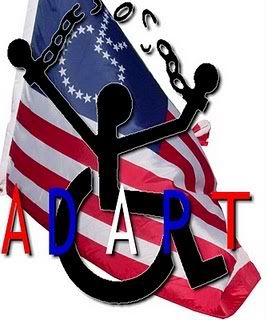 [picture description: we want the power! participants/trainers during the "power game"]
[picture description: we want the power! participants/trainers during the "power game"]
Day 2 of AYS was all about simulations & games. Day one was too after the meet & greet stuff. At this point I'm slightly confused about what games were what day. It doesn't matter though. We played this game called big country/little country, which I can't explain cause if you've never played it before, it'll ruin it for you. We played stand & declare (or was it stand and decide?) -- Here's a statement... T or F? Explain a bit. We learned about the history of ADAPT, what we stand for and why we do things the way that we do. I almost get the difference between an advocate and an activist. I mean, I do get it, but just not enough to explain it to someone else. We discussed the intersections of different groups. ie women, or african americans, or LGBT, or PWDs and poverty or violence, etc. We got up in groups of 4--2 ADAPTers & 2 cops. A) You want a meeting inside the building w/so-and-so & B) somebody already inside the building is out of oxygen and will die if you don't get the cops to call in some EMTs. GO! What do you do? Act it out... We also played the "power game." Someone has the "power" (a toy lightsaber) and we had to get the power from her, but we couldn't touch her (or her chair) or talk to her. We had to go through her bodyguard. We won when lunch showed up and we started bargining the food for the power. Did I miss anything else? Let me know... [picture description: CURB CUTS NO BUTS! A picture of one of the rough spots on the curb cut at the corner]
[picture description: CURB CUTS NO BUTS! A picture of one of the rough spots on the curb cut at the corner]
But the thing that sticks in my mind the most, and the thing we spent the most time on during the 2nd day was our simulated action. We went around the group and came up with real life situations and then voted on the most "winnable." There's some rough curb cuts at the corner. Fix them. We went with that.
We each took roles and then had to plan out the action from start to finish. I wish I'd coppied down the list of all the jobs. There are so many! Let's see... there's the leaders, scouts, runners, sign makers, flyer makers, police contacts, media contacts, researchers, negotiators, chant leader... oh geez, what am I missing...??? Then after dinner we acted it out with the trainers playing the roles of the guy we wanted to see, the secretary, police, etc (I can't even remember all those roles at this point, wish I'd typed this earlier). One of the trainers (who is not blind) played a blind guy. Put on his sunglasses, found something he could use as a cane. He had a previously scheduled meeting; we "had to let him in." That's an important lesson. Just because he looks like "one of us" doesn't mean he is one of us. He could be blind and just not jive with our ideals, or he could be someone we're really trying to keep out in disguise. Never let someone in unless your color leader tells you to. I'm willin to bet that 9 times out of 10 they will tell you not to. Sorry... come back another day... 3 people got "arrested" but we won when we got a half hour meeting w/the guy 2 weeks from then where 3 people could come (or was it 2?). Always get it in writing.
What took me a few weeks to get (mulling it around in my head wasn't enough, had to bounce it off someone else) was why these "simulations" were so great. Invaluable really. How we learned so much that will stick with us. I've been vehemently against simulations since I ran across this article through some random internet search back in high school. Something like 6 or 8 years ago. What my friend was able to explain to me was that there is a BIG difference between simulating a skill for competency's sake and simulating emotion. emotion=pity. skill=a more productive outcome. I get it. She's right. Except... How do you know that you are simulating skill and not accidentally emotion? [picture description: a sample of what boardmaker can do]
[picture description: a sample of what boardmaker can do]
Summer 06 I was living with 2 girls that were getting their masters in speech pathology. They were taking an AAC class. They had to design a binder using boardmaker (pictures) and a letter board. There were paramiters about how many pages there could be and what should/could be on them. My mom came up the day they had to use them. They couldn't talk all day. They were only allowed to point. She took us all out to lunch. The 2 of us spoke and the 2 of them did not. My mom asked me why I thought that was OK. I couldn't explain it simply, but now I can--they were learning a skill they will use all the time at work.
However I never read the papers they had to write on the experiance. I can't help but wonder if they wrote about how awful it was, how frustratingly difficult it was. Yes, I imagine it could be. Except... if you were never able to communicate at all, or could and had that ability suddenly taken away from you for an extended period of time, and someone gave it back to you--not the most efficient method, but a method nonetheless--wouldn't it be incredibly freeing? When they wrote their papers did they focus on how GREAT it would feel to receive a custom made binder? Did they truely learn a skill or end up with a more strongly reinforced ableist viewpoint?
My friend answered my question very well, but she left me with another one which is more difficult to answer. How do you ensure your desired outcome? Because in Chicago I learned that simulations can be great...
It's Beginning to Look A Lot Like Fun*Run Time
It's ALREADY that time of year again: The ADAPT Fun*Run for Disability Rights is April 22nd 2012. Maryland's fundraising goal is $8,000 this year. Yes, that's right, $8,000
Donate $1! Donate $10! Donate $100! Donate $1,000! JUST DONATE so we can FREE OUR PEOPLE! http://adaptfunrun.org/runner.php?id=7 I thank you very much for your support!
Monday, July 6, 2009
Back to my AYS Posts: Day 2
Tags:
AYS,
games,
simulations
Subscribe to:
Post Comments (Atom)

















0 comments:
Post a Comment